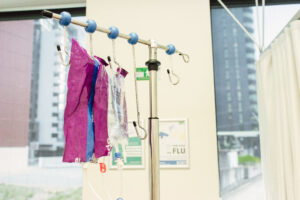Treatment and transplant news
Discover more about the latest developments in blood cancer treatment availability.
Treatment news

Here’s a summary of recent new and recommended listings for blood cancer treatments. The Leukaemia Foundation provided advice and consumer comments to PBAC/MSAC in support of these therapies being available to patients.
Newly listed
- The Minister for Health and Aged Care, the Hon Mark Butler MP, announced the Phamaceutical Benefits Scheme (PBS) listing of CALQUENCE® acalabrutinib tablets (as maleate monohydrate) for use as monotherapy or in combination with obinutuzumab for the treatment of previously untreated chronic lymphocytic leukaemia (CLL) and small lymphocytic lymphoma (SLL) from 1 January 2024.
Recommended for listing
- PBAC has recommended the listing of Imbruvica ® (Ibrutinib) for use in combination with venetoclax for the treatment of patients with previously untreated chronic lymphocytic leukaemia (CLL) and small lymphocytic lymphoma (SLL).
- MSAC has supported the public funding of Tecartus® (brexucabtagene autoleucel), a CAR-T therapy for relapsed or refractory CD-19-positive B-precursor acute lymphoblastic leukaemia (ALL) in patients aged 26 years or above.
- MSAC deferred its advice for public funding of ciltacabtagene autoleucel (cilta-cel), a B-cell maturation antigen (BCMA)-directed chimeric antigen receptor T-cell (CAR-T) therapy for the treatment of adult patients with relapsed or refractory multiple myeloma (RRMM), who have received at least four prior lines of therapy. MSAC considered the clinical place of cilta-cel and the proposal for its use as a later line of therapy in the context of RRMM for patients was reasonable. However, MSAC considered the incremental cost-effectiveness ratio (ICER) was both unacceptably high and underestimated.
Following a positive recommendation, the government will enter discussions with the respective pharmaceutical company. This will help determine the cost of the treatment, and the subsidy applied. Once this has been agreed on, the treatment can be listed on the Medicare Benefits Schedule (MBS) or PBS. The treatment will then become more affordable and accessible for patients.
Leukaemia Foundation are continuing to monitor the upcoming agendas for PBAC and MSAC meetings and provide additional information and consumer lived experience, in the form of submissions, to support access to these therapies as needed.
Transplant news
- The Federal and State and Territory Health Ministers have committed to enhancing the Australian Bone Marrow Donor Registry (ABMDR) through a $4.2 million funding boost. The ABMDR helps match volunteer donors with patients requiring a bone marrow transplant, also known as a stem cell transplant.
- The Victorian Legislative Assembly Legal and Social Issues Committee has released a new report called ‘Register and talk about it’ from its inquiry into increasing the number of registered organ and tissue donors. It made nine findings and six important recommendations directly related to improving our stem cell donation system. The Leukaemia Foundation played an active role in the inquiry, including appearing at the public hearing and providing a written submission.
And finally
The Medicines Repurposing Program (MRP) has been launched, identifying new uses for existing medicines registered on the Australian Register of Therapeutic Goods (ARTG), a public database of therapeutic goods that can be legally supplied in Australia.
It aims to facilitate and encourage ARTG registration and consideration by PBAC for listings on the PBS. Put another way, it makes it easier for non-companies to provide submissions to PBAC or MSAC to obtain subsidies for treatments.
The Leukaemia Foundation played a direct role through submissions and advice on all topics covered above. With your help and input, we will continue to do so.
Look out for our requests for consumer input, and/or please reach out to us if you have an interest in participating in the processes involved in approving/subsiding new treatments for use in Australia.
Last updated on April 30th, 2024
Developed by the Leukaemia Foundation in consultation with people living with a blood cancer, Leukaemia Foundation support staff, haematology nursing staff and/or Australian clinical haematologists. This content is provided for information purposes only and we urge you to always seek advice from a registered health care professional for diagnosis, treatment and answers to your medical questions, including the suitability of a particular therapy, service, product or treatment in your circumstances. The Leukaemia Foundation shall not bear any liability for any person relying on the materials contained on this website.